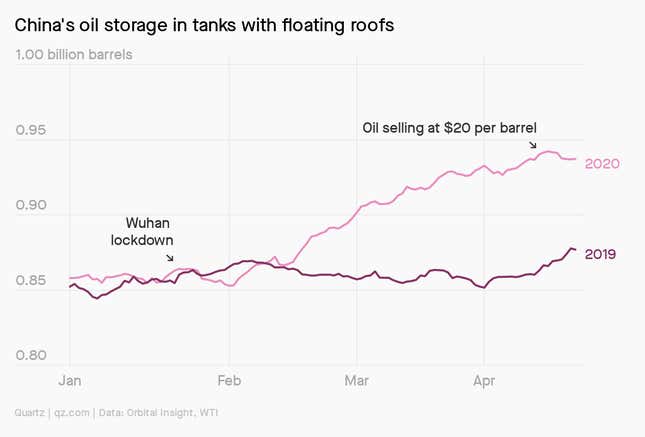Good morning, Quartz readers!
Here’s what you need to know
Texas is lifting its lockdown. It will let its stay-at-home order expire on Thursday and permit some businesses to reopen at 25% capacity, despite low coronavirus testing levels. Colorado, Minnesota, Mississippi, and Tennessee have also let go a little.
Canadian provinces are doing the same. New Brunswick is the first to ease physical distancing rules after reporting zero cases in a week. Saskatchewan will let businesses reopen next week, and the most populous ones—Ontario and Québec—have a timeline for easing restrictions.
Sweden has taken a very different approach to coronavirus. Schools and restaurants have remained open during its outbreak. The government placed the responsibility of distancing on its citizens, and they have abided. But the data suggests it’s not working.
The US small business loan program hit another snag. The second round of relief has suffered computer glitches. The first round, totaling $350 billion, was depleted in two weeks, and there were concerns that some recipients were too big to have qualified.
It’s a big week for corporate earnings. Alphabet, Pfizer, Starbucks, and UPS are some of the major names reporting today, with HSBC already posting a 50% drop in profits this morning. BP fared even worse, losing $4.4 billion this quarter.
GM scrapped dividends. The decision came after it was forced to shut factories and dealerships across the US. Nine other firms on the S&P 500, across a variety of industries, have done the same this month.
The Supreme Court dismissed a supremely controversial New York gun law case. It issued a per curiam opinion—an unsigned decision, often signaling unanimity. But the justices were not all in agreement.
Join Quartz at Work this Thursday for “Career Building in Quarantine.” More people are job hunting than ever right now. In this one-hour workshop, a group of experts will teach you to stand out and continue to build a meaningful career during lockdown. Click here to register.
Charting China’s oil-buying spree
Data from Orbital Insight show 937 million barrels of oil in China’s observable storage (✦ a Quartz member exclusive). It’s the highest level the company has measured since it began tracking in January 2017, and it provides a valuable indication of broader global trends.

Crude isn’t the only commodity that China is stockpiling. It also plans to store 10 million tons of soybeans, 20 million tons of corn, and 1 million tons of cotton, Reuters reports.
For Quartz members
Check out Quartz membership with a ✦ seven-day free trial
- People are now embracing modes of exercise with roots that stretch back even further than Jane Fonda’s tapes and the bull worker.
- Need a good home workout jam? Music streaming and TikTok are boosting Track 1 hits, and possibly killing off the album in the process.
- The cubicle may be on its way back. Physical barriers in workplaces might be reviled, but they also keep you safer from your colleagues’ sneezes.
We’re obsessed with memory foam
Sink into the good stuff. Memory foam is found in football helmets, motorcycle seats, and bulletproof vests. By 2023, the US market for mattresses and pillows made of this chemical viscoelastic material is projected to hit $8 billion—but the bed-in-a-box industry is excessively wasteful. Lie back and ponder it all with the Quartz Daily Obsession.
Surprising discoveries
The Romans invented recycling. Excavations at Pompeii show that mounds of rubbish piled outside city walls were collected, sorted, and resold.
Australia is training animal disease detectives. Vets will learn how to identify new pathogens that appear in animals, in a bid to prevent a future pandemic of a zoonotic disease.
Belgians are being urged to eat fries twice a week. Potato farmers don’t want the huge stash of surplus spuds in warehouses to go to waste.
The peanut remains mighty despite the pandemic. The humble crop’s success is bad news for fashion: Farmers often choose between planting peanuts and cotton.
A bored artist has given himself a tattoo for every day under lockdown. There’s just one problem: he’s running out of space.
You asked about accessibility in a masked world
I read lips and look at gestures to just get by. How am I to survive when people are masked?
Elaine, we knew just who to ask. Quartz curator and deaf individual Patrick deHahn—who just wrote about this very predicament—responded. “You aren’t alone,” he says. “Face masks are a significant communication barrier for many. One workaround is speech-to-text smartphone apps like Ava or Google’s Live Transcribe to caption your everyday conversations. A small microphone that plugs into your phone’s audio port may be needed for accuracy, especially with physical distancing.
“Writing with a whiteboard or pen and paper is always a good fallback. Lastly, there are transparent masks (and YouTube tutorials to make your own) but mass adoption is needed for it to really work for everyone.”
✉️ Do you have a burning question about how coronavirus is changing the world?
Our best wishes for a productive day. Please send any news, comments, fries with ketchup and hot sauce, not mayonnaise, to hi@qz.com. Get the most out of Quartz by downloading our app on iOS or Android and becoming a member. Today’s Daily Brief was brought to you by Adam Rasmi and Hasit Shah.